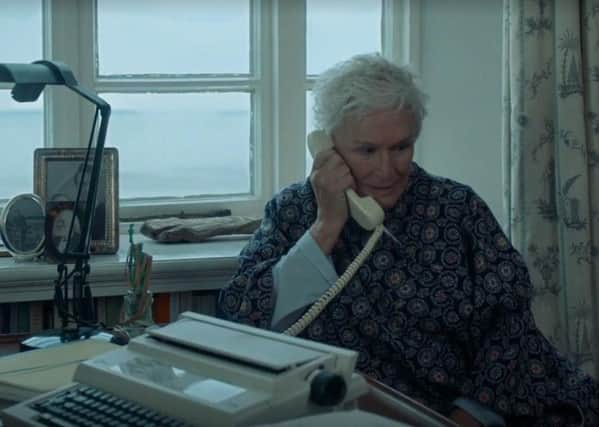Film reviews: The Wife | Redcon-1 | Black 47 | Skate Kitchen


The Wife (15) **
Redcon-1 (18) *
Black 47 (15) ***
Skate Kitchen (15) ****
Like the recent Emma Thompson film The Children Act, The Wife is another drearily middle-brow literary adaptation in which a fine performance from its female lead exposes how cinematically flat the surrounding drama is. Starring Glenn Close as the dutiful spouse of a heavy-weight American novelist, the film is built around a fairly obvious and clumsily handled mystery, but Close’s enigmatic performance gets at a truthfulness about creativity and authenticity that transcends the rather stagey way director Björn Runge and screenwriter Jane Anderson have adapted Meg Wolitzer’s source novel.
That comes through mostly in the way her character, Joan Castleman, endures all manner of micro-humiliations as her husband, Joe (Jonathan Pryce), wins the Nobel prize for literature. Joe is a literary lion in the mould of Saul Bellow and Philip Roth and Pryce – who played a very Roth-like writer in Alex Ross Perry’s coruscating literary themed comedy/drama Listen Up Philip — plays him as an insufferable and insincere windbag, the sort of person who has bought into the lifestyle of the self-important artist and craves the obsequious attention he frequently makes a public show of disdaining.
Advertisement
Hide AdHe makes a public show of thanking Joan for his success, too, but he also makes it pointedly clear that he’s the writer in the family, even though flashbacks detailing the origins of their relationship show she had literary ambitions of her own – ambitions she had to modify when confronted with the patriarchal bent of the publishing industry in the early 1960s (the rest of the film is set in the 1990s).
These flashbacks are triggered in part by a would-be biographer of Joe (Christian Slater), who’s starting to take more of an interest in Joan, and though they’re rather stilted and perfunctory, Close’s performance as present day Joan does cast her past in a darker light. The pain and resilience that frequently flashes across her face may be redolent of someone resentful about having to suppress her own ambitions, but there’s an ambiguity there too, suggestive of someone more ruthlessly complicit in her own fate than she’s willing to let on. Here, Close instinctively understands the lingering power of inscrutability, so it’s too bad the film doesn’t. It spells things out that don’t need spelling out and, come the climax, turns the story soapy instead of matching the intelligence of its star.
Though set mostly in Sweden, The Wife was partially filmed in Glasgow, the city providing a suitably anonymous backdrop for a few cost-effective exterior shots of Stockholm. Coincidentally, zombie movie Redcon-1 also uses Glasgow as a stand-in for another city, albeit without bothering to disguise the fact. Early on, for instance, two squads of soldiers en-route to extract a missing scientist from a zombie outbreak in London can be seen bombing it down what is clearly the Clyde in a couple of speedboats. A few seconds later we see them walking past Tower Bridge and straight into a zombie ambush in the Barras, the entrance gate clearly visible in the background of the shot. The fact that nothing matches is not the only thing indicative of how rubbish this is: with no particular feel for plot, performance or basic technical competence, it’s the Scottish Mussel of zombie movies.
Black 47 on the other hand wants to be the Irish Braveheart. Set against the backdrop of the potato famine and featuring Australian leads and an unashamedly biased view of history, the film manages to turn human tragedy into a gnarly action film. James Frecheville (Animal Kingdom) takes the lead as Feeney, a colonial soldier who returns home to find a country ravaged by starvation and his family destroyed by the English oppressors he’s spent years serving. Intent on revenge, he sets out to destroy the men who played a part in their deaths, all the while pursued by Hannah (Hugo Weaving), a disgraced policeman given a shot at redemption after beating a prisoner to death. Borrowing from lots of revisionist westerns, Lance Daly’s film isn’t subtle, but as a genre film it has a certain pulpy intensity that keeps it rattling along.
Crystal Moselle follows-up her intriguing and provocative documentary The Wolfpack with Skate Kitchen, a wonderfully loose dramatic feature built around an all-female skateboarding collective in New York. Utilising the real skaters to play versions of themselves, she’s fashioned an authentic coming-of-age film that eschews the contrived plotting that movies about teens tend to utilise in favour of something dreamier, more rambling and more reflective of the uncertainties and hopefulness that comes from these all-too-brief years when it’s actually possible to live in the moment. Newcomer – and Skate Kitchen founder – Rachelle Vinberg takes the nominal lead as Camille, a somewhat gawky, tom-boyish kid from nearby Long Island who finds her tribe in New York after ditching school to go skateboarding. Moselle is great at capturing the freedom the city offers the young and the adventurous and the extended skate scenes show a side of New York movies don’t normally capture. But more than 20 years on from Larry Clark’s Kids, it’s also great to see a film that addresses teen sexuality, gender identity, drug use and more in ways that feel neither prurient nor exploitative; just raw and honest. ■